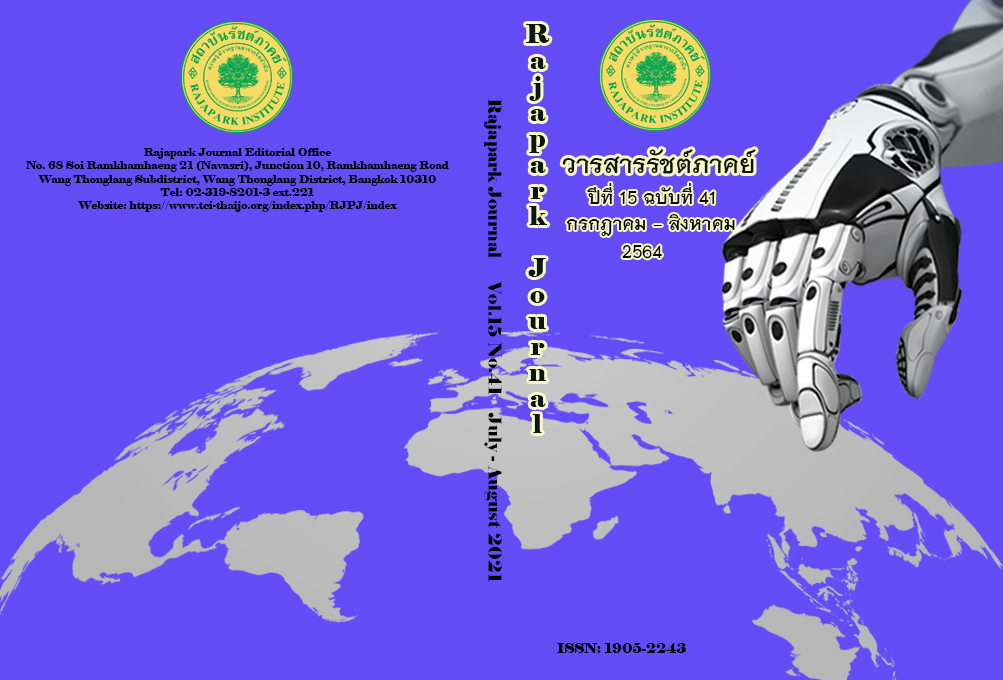Confirmatory Factor Analysis of Servant Leadership of Fire and Rescue Officer and Assistants in Bangkok Metropolitan Administration
Main Article Content
Abstract
This research has the objective to analysis the components of servant leadership of Fire and Rescue Officer and Assistants in Bangkok Metropolitan Administration with the empirical data. There were 310 participants used as a sampling group and were selected by Simple Random Sampling. A questionnaire was used as the research instrument in this study. The Model was validated using confirmatory analysis through AMOS program. The research results indicated that the components of servant leadership were at high and very high levels. The Conceptualization component was the highest score of servant leadership. The model showed its consistency with the empirical data with 2/df = 1.507, P-value = 0.053, GFI= 0.977, CFI = 0.996, RMR = 0.005 and RMSEA = 0.040
Article Details
Views and opinions appearing in the Journal it is the responsibility of the author of the article, and does not constitute the view and responsibility of the editorial team.
References
Ali, A. (2012). Leadership and its Influence in Organizations – A Review of Intellections. International Journal of Learning & Development, 2(6), 73-85.
Chamnan, S. (2011). The Servant leadership: New Perspective in Educational Leadership. Journal Educational Administration Burapha University, 5(2), 1-14.
Chanayotha, P. (2014). Open Educational Resources Development Based on Service Learning Approach to Enhance Public Consciousness and Creative Problem Solving for Rajabhat University Students. Doctor of Education. Chulalongkorn University.
Chiangkul, W. (2000). Dictionary of Modern Management (2nd ed.). Bangkok: Saithan.
Chiangkul, W. (2007). A Leaders Who Transformed and Inspires the World. Bangkok: Saithan.
Chairungruang, C. (2015). The Global Leader of Future: Understand Cultural Differences and Keep Abreast of Current World. Journal of Chandrakasem Sarn, 21(41), 1-8.
Kangpheng, S., & Kunlong, S. (2010). Servant Leadership in Organization: Concept, Principle, Theory and Research. Khon Kaen: Klung Press.
Kongthiang, S. (2013). Serrant Leadership. Journal of Teachers' Professional Development, 12(10), 89-92.
Krongmongkol, V., & Akakulanan, S. (2012). Leadership, Organizational Climate and Organization Citizenship Behaviors Affecting Job Performance of Government Official in one Government Agency. Journal of Social Sciences and Humanities, 38(1), 214-227.
Mahapasuthanon, T. (2011). Principles of management. Bangkok: PNK & Sky Printing.
Mekeewaraphan, K. (2017). The Developing of Servant Leadership in the Management of Modern Retail Business in Nonthaburi. The journal of Pacific Institute of Management Science, 3(1), 161-172.
Mrazek, N. (2016). Ethical Leadership Development of School Administrators Under the Office of Basic Education Commission. Doctor of Philosophy, Educational Administration. Burapha University.
Mullins, L. J. (2010). Management and Organisational Behaviour (9th ed.). England: Pearson Education.
Notar, C. E., Uline, C. S., & Eady, C. K. (2008). What Makes an “Effective” Leader: The Application of Leadership. International Education Studies, 1(3), 25-29.
Nunthong, S. (2015). The Developing Servant Leadership Trait of Executives in Local Government. Journal of Graduate Studies Review Nakhonsawan Buddhist College, 3(3). 139-149.
Office of the Bangkok Civil Service Commission. (2018). Report Data analysis of the Bangkok Metropolitan Government Officials Annual fiscal year 2017. Bangkok: Author.
Patipan, K. (2012). A Structure Equation Model of Creative Leadership for Vocational College Administrators. Doctor of Philosophy (Educational Administration). Khon Kaen University.
Prajongjai, T. (2014). Relationship Between Transformational Leadership and Teamwork as Teachers’ Opinion in Basic School Under the Office of Trat Primary Educational Service Area. Master of Education (Educational Administration). Ramphai Barni Rajabhat University.
Rachmawati, A. W., & Lantu, D. C. (2014). Servant Leadership Theory Development & Measurement. Procedia-Social and Behavioral Sciences, 115, 387-393.
Rungkhunakorn, B., Anansirikasem, P., & Jitcharat, S. (2017). Servant Leadership for Village Health Volunteer: Concept and Theory for Development. Veridian E-Journal, Silapakorn University (Humanities, Social Sciences and Arts), 10(1), 1103-1114.
Sangsuwanwow, N., Laohawichian, U., Sangmahachai, S., & Lawangkul, P. (2018). Change of Government Organizations under the Thailand Strategy 4.0. Phimoldhamma Research Institute Journal, 5(1), 67-78.
Sawatburi, O. (2012). Behavior and Communication in Organizations. Bangkok: Chulalongkorn University.
Simsen, O., & Ariratana, W. (2014). The Administrators’ Servant Leadership Affecting Effectiveness of Schools Under the Office of Secondary Educational Service Area 25. Journal of Education Graduate Studies Research, 8(2), 217-226.
Singmatr, S., Meemana, P., & Kaewin, D. (2017). Leadership traits of the Executive in the 21st century. The 2nd National Graduate Research Conference; RMU GRC 2017, pp. 487-493.
Sirimahasakorn, B. (2006). Authentic Leader. Bangkok: Saengdao.
Sirisuk, K. (2015). Servant Leadership That Affectional Administration Performance, The Office of Education Service in Songkhla Province. Songkhla: Songkhla Rajabhat University.
Spears, L. C. (2010). Character and Servant Leadership Ten Characteristics of Effective, Caring Leaders. The Journal of Virtues & Leadership, 1(1), 25-30.
Srichan, T., Tachaphahapong, S. S., & Methakunavudhi, P. (2016). A Factor Analysis of Leadership in the Twenty First Century of Student Organization Board. Journal of Research Methods, 29(2), 139-156.
Watcharakate, S. (2014). Ten Principles of Servant Leadership for Nurse Leaders. Journal of The Royal Thai Army Nurse, 15(3), 44-48.
Witchawut, S. (2014). Psychology of Leadership (2nd ed.). Bangkok: Thammasat University Press.
Yamane, T. (1973). Statistics: An Introductory Analysis (3rd ed.). New York. Harper and Row.


